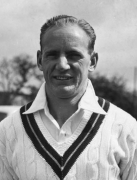Related Research Articles

Robert Graeme Pollock is a former cricketer for South Africa, Transvaal and Eastern Province. A member of a famous cricketing family, Pollock is widely regarded as South Africa's greatest cricketer, and as one of the finest batsmen to have played Test cricket. Despite Pollock's international career being cut short at the age of 26 by the sporting boycott of South Africa, and all but one of his 23 Test matches being against England and Australia, the leading cricket nations of the day, he broke a number of records. His completed career Test match batting average of 60.97 remains fifth best after Sir Donald Bradman's (99.94), Marnus Labuschagne's, Steve Smith's, and Adam Voges's averages.
This article describes the history of South African cricket from the aftermath of the First World War in 1919 to the end of the Second World War in 1945.

Edgar John Barlow was a South African cricketer. Barlow was born in Pretoria, Transvaal, South Africa, and played first-class cricket for Transvaal and Eastern Province from 1959–60 to 1967–68 before moving to Western Province for the seasons from 1968–69 to 1980–81. During this time he also played three seasons with Derbyshire in the English County Championship from 1976 – 1978. He completed his first-class career in Boland in 1982–83. Barlow was named as one of the six South African Cricket Annual players of the year in 1962.
Bryan William Yuile is a retired cricketer who played 17 Test matches for New Zealand in the 1960s. He played first-class cricket from 1959 to 1972, until his religious objection to playing on Sundays led to the end of his career.
Arthur William Seccull was a cricketer who played one Test match for South Africa in 1896.

Trevor Leslie Goddard was a Test cricketer. An all-rounder, he played 41 Test matches for South Africa from 1955 to 1970. He captained the young South African team on its five-month tour of Australia and New Zealand in the 1963–64 season, levelling the series with Australia, and was also captain in 1964–65 against England in South Africa.
Robert Graham was a South African Test cricketer who played two Tests in the 1898-99 season.

Edward Russell Henry Fuller was a South African cricketer who played in seven Tests from 1953 to 1957. He was born in Worcester, Western Cape and died in Milnerton, Cape Town.

David Bartlett Pithey was a Rhodesian cricketer who played in eight Tests for South Africa from 1963 to 1967. As well as playing for Rhodesia and Western Province, he played first-class cricket for Oxford University and Northamptonshire. Christopher Martin-Jenkins described him as "spasmodically brilliant". His brother, Tony, also played Test cricket for South Africa; they played together in five of the Tests on the 1963–64 tour of Australasia.

Michael Arthur 'Kelly' Seymour was a South African cricketer who played in seven Tests from 1963 to 1970.

Clive Gray Halse was a South African cricketer who played in three Tests in 1964.
Grahame Anton Chevalier was a South African cricketer who played in one Test in 1970.
This article describes the history of South African cricket from its known beginnings until the end of the First World War in 1918.
This article describes the history of South African cricket from the end of the Second World War in 1945 to the start of South Africa's cricket isolation in 1970.
The England cricket team toured South Africa under the auspices of the Marylebone Cricket Club from December 1905 to March 1906. There were five Test matches, and seven first-class games against South African provincial teams. While the team won a number of their first-class matches, they also lost several, and South Africa won the Test series 4 to 1.
The South African Fezela XI was a team of young South African cricketers who toured England in 1961 under the captaincy of the Test player Roy McLean. Several of the team later went on to play leading parts in the revival of South Africa’s cricket fortunes in the 1960s.
South African Universities are a former first-class cricket team in South Africa. They played 35 first-class friendly matches, usually one match per season, between March 1949 and January 1990.
Colin George Rushmere was a South African conservationist and cricketer who played first-class cricket from 1957 to 1965.
Sydney Austen Cowper was a South African-born cricketer whose six-match first-class career spanned from 1908 to 1924. He played once for Western Province in South African domestic cricket, twice for the Argentine national side, and finally three times for Rhodesia.
Harry Ernest Smith was a cricketer who played first-class cricket in South Africa from 1905 to 1908. He toured England with the South Africans in 1907 but did not play Test cricket.
References
- ↑ South Africa v England, Cape Town 1964-65
- ↑ "1st Test, London, Jul 22 - Jul 27 1965, South Africa tour of England". Cricinfo. Retrieved 2 February 2021.
- ↑ "Test Matches played by Harry Bromfield". CricketArchive. Retrieved 2 February 2021.
- ↑ "Western Province v Transvaal 1960-61". CricketArchive. Retrieved 21 June 2016.
- ↑ "Western Province v Transvaal 1962-63". CricketArchive. Retrieved 21 June 2016.
- ↑ "First-Class Bowling in Each Season by Harry Bromfield". CricketArchive. Retrieved 2 February 2021.